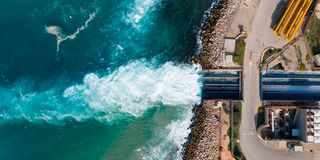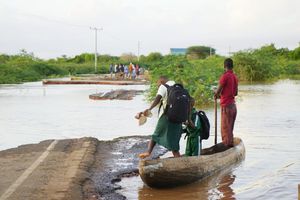Global water crisis: Kenya, Israel can do a lot together

A top view of the largest water desalination facility in the world in Hadera, Israel.
The close connection between the water crisis and the climate crisis was noted in the COP27 summary statement and will be a central theme during the UN Water Conference today at the UN headquarters in New York.
In the past year, and with the decline of Covid-19, the world returned to focus on the most pressing existential threat – global warming and climate change, and their devastating effects on the world we live in. One of the main areas critically affected by climate change is the global rainfall cycle, resulting in less rain, more droughts and extreme rain events bringing with them more destruction than blessings.
Against this background, water management becomes crucial. Management accompanied by relevant technology.
While many places in the world still have full access to clean tap water, in many other places, access to the commodity is limited and almost nonexistent.
As a country with one of the most advanced water management systems in the world, and with an abundance of R&D and innovative technologies, Israel can make a significant contribution to Kenya.
Israel’s water infrastructure was developed in dire reality. A recently established state, military attacks from Syria on our water resources, a huge wave of new migrants, critical economic constraints and more. Yes, not to mention the fact that half of Israel is a desert.
As a country, we made many mistakes and had our successes. We want to share our experience so that Kenya will avoid our mistakes and enhance our successes.
The areas for cooperation are many. One example is the treatment and recycling of sewage: Israel holds a world record in this field, with 95 per cent of its wastewater being treated, from which almost 90 per cent is used in agriculture. In Israel, we use the byproducts of treated sewage to produce organic fertilisers.
Another field in which Israel holds a world record is the prevention of water loss in urban systems. While in Israel little water is lost in urban supply systems, in other countries, the rate is high.
The paradox is that these are often arid and water-scarce countries where the shortage of water represents a significant burden. In Israel, a comprehensive variety of technologies and methods have been developed to detect leaks and prevent water loss in supply systems.
Desalination
Seawater desalination, the use of brackish water in agriculture, drip irrigation, the development of agricultural varieties that consume less water, and even extraction of water from the air, are all fields that are developed in Israel.
Today, 65 per cent of our potable water is desalinated seawater. Soon, with the inauguration of a newly built (200 million c/m per year) seawater desalination installation, this rate will reach 80 per cent.
The President of Kenya places water management and availability of water to each Kenyan citizen, at the very top of his agenda. So do the governors in many counties. We have an ongoing engagement with the national government as well as with county governments and we will continue enhancing it.
H.E. Michael Lotem is Israeli Ambassador to Kenya, Uganda, Tanzania, Malawi and Seychelles.




